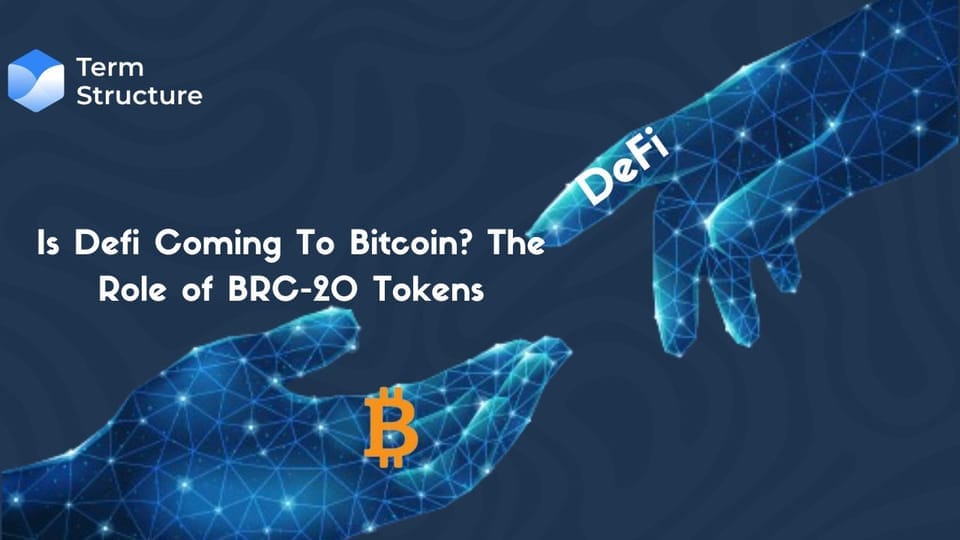Is DeFi Coming To Bitcoin? The Role Of BRC-20 Tokens

Introduction
In the early days, discussing DeFi on Bitcoin was met with skepticism, especially as Ethereum began to demonstrate its capabilities as a DeFi platform. While Bitcoin lacked the native smart contract functionality that made Ethereum suitable for DeFi, the scene has evolved. The introduction of BRC-20 tokens on the Bitcoin network has reignited discussions about integrating DeFi capabilities without traditional smart contracts. Instead of traditional smart contracts, developers could approach this by using what Vitalik Buterin calls "persistent scripts," a different method to extend Bitcoin's functionality. In this article, we will delve into BRC-20 tokens, exploring their applications, potential, and challenges.
Understanding BRC-20 Tokens
BRC-20, a newly proposed standard for minting tokens on Bitcoin, has emerged as a potential gateway to bring Defi on Bitcoin. Unlike ERC-20 tokens on Ethereum, BRC-20 tokens do not support smart contracts.
On March 9, a Crypto Twitter user known pseudonymously as domo outlined a method to leverage the Ordinals Protocol for BRC-20. He suggested that fungible token standards could be created on Bitcoin to inscribe JSON data, a widely-used text-based data format, onto individual satoshis. This approach thus enables three core operations: deploying, minting, and transferring tokens, paving the way for numerous possibilities and innovations.
Use Cases and Market Activity
Despite their limitations, BRC-20 tokens have attracted significant interest and market activity within the crypto community. Various projects are now exploring how to use BRC-20 tokens for diverse applications. Below are the Top 5 BRC-20 Tokens are $ORDI, $SATS (ORDINALS), $PUPS (ORDINALS), $MUBI, $WZRD. Let’s take a look at $ORDI, the BRC-20 token with the highest market capitalization.
Source: Coingecko
$ORDI: The Pioneer BRC-20 Token
ORDI, a cryptocurrency independent of Casey Rodarmor's original Ordinals project, operates on the Bitcoin network using the BRC-20 standard. Unlike the Ordinals protocol, which embeds NFT-like data into Satoshis, ORDI issues transferable tokens without leveraging the specific functionalities of the Ordinals protocol. First inscribed on March 8, 2023, and listed on various exchanges by May 2023, ORDI quickly rose to prominence, amassing a market value of $348 million and becoming the highest-valued token in the BRC-20 category with a market cap of $68 million. Despite its classification as a meme coin, ORDI's success highlights significant growth in Bitcoin-based tokens and marks a notable development in the cryptocurrency market.
Future Prospects and Challenges
The future outlook for DeFi on Bitcoin using BRC-20 tokens is promising, given the ongoing technological developments and advancements. There is a strong desire within the community to see BRC-20 tokens facilitate services similar to those on Ethereum, such as lending and borrowing platforms like Term Structure, and decentralized exchanges like Uniswap, dydx, and Perpetual Protocol.
However, the adoption of BRC-20 tokens faces significant challenges. Currently, the BRC-20 standard remains a proposal, and its integration into widely used blockchain tools such as wallets and exchanges is uncertain. For the average user, accessing BRC-20 tokens could be difficult for the foreseeable future. Wallets and exchanges would need to develop specialized features to support both ordinals and the new BRC-20 tokens, presenting a substantial barrier to entry. Moreover, the regulatory landscape surrounding Defi and BRC-20 tokens is complex, with concerns about compliance and security.
Conclusion
In conclusion, the integration of Defi functionalities with Bitcoin using BRC-20 tokens presents a promising yet complex landscape. While the potential for Defi on Bitcoin is evident, overcoming technical, regulatory, and infrastructure challenges will be crucial for realizing the full benefits of this integration beyond memes and experiments.

